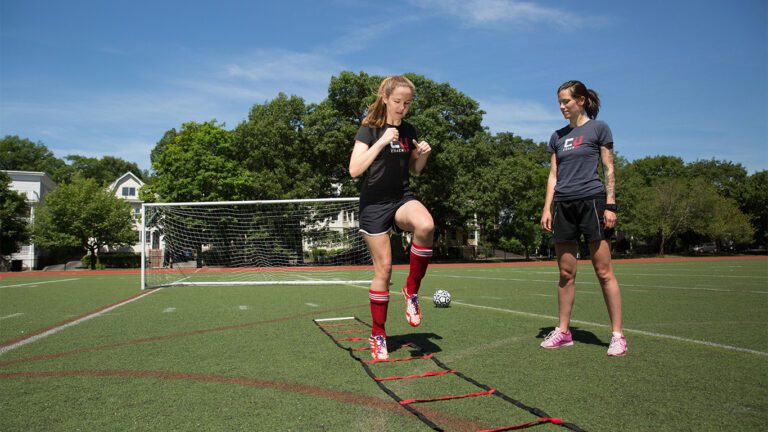Summer may have just ended, but it will be back before we know it. For many high school soccer players, next summer will bring the opportunity to attend college identification camps, clinics, and showcases. These events can be very valuable to current high school players who want to continue their academic and athletic careers in college. They are designed for individuals who are looking to compete against higher level competition as well as gain exposure from college coaches.
Before we provide some tips and strategies to make the most out of your college camp experience, you need to understand the different types of camps.
There are three types college ID camps and clinics we will discuss:
- College ID camp hosted by a third party.
- College ID camp hosted by a college program.
- College ID camp hosted, managed, and run by a college program only.
Four reasons to attend a college ID camp/clinic or Showcase:
- Gain college exposure
- Improve your skills to become a better player
- Compete against higher level of competition in order to evaluate your abilities against other players
- Experience a specific college program environment
Whatever your reason is for attending a college ID camp or clinic, be sure you select the right type of camp to get the most out of your experience.
Independent college ID camp
An organization that has no affiliation with any college program will bring in college coaches to work their camps. Many college coaches who do the camp circuit over the summer use it as an opportunity to earn extra income. It also gives the coaches a chance to do some recruiting while working the camp. While college coaches are there they will train, identify, and evaluate the campers that are in attendance.
College ID Camps hosted by a college
There are many head college coaches that will run their own camps in the summer. They bring in a number of other college coaches to work their camps. These group settings with many college coaches in attendance offer a fantastic opportunity for players to get exposure.
College ID camp/clinic managed and staffed by that college program only
These tend to be smaller and shorter events. Prospective student-athletes will get the opportunity to experience what it would be like to attend that school and play for that program. Be aware that these types of camps are also money makers for the college programs. Be sure that you have had some interaction with the staff and there has been a personal invitation from the program. Just about every program, DI, DII, and DIII has their own ID camp or clinic throughout the year. Visit each program’s website to find out more info about possible camps or clinics. The one-day clinics are a great opportunity to get a feel of what it would like to play that for that program. They are typically pretty affordable at $75 – $150 for the day. If you want to get identified by a program you will have a better odds if you attend multiple single-day clinics rather than going to one of the big camps which cost the same amount.
Now that you have discovered your reasons to attend an ID camp, and have selected the camps you are going to attend, here are some tips to really make the most out of your college camp experience.
1. Make contact with the coaches
Review the list of coaches who will be attending the camp. If there are schools that you may be interested in, write to the coaching staff expressing interest in their program. Let them know that you will be attending the camp and that you look forward to meeting them and having them watch you play. Be personal, specific, and honest! You should start building a relationship with the coach before arriving for camp.
2. Get one-on-one time with a coach
While you are at camp, find or create an opportunity to personally meet the coaches for the programs you’re interested in. Try to take a couple minutes to introduce yourself and tell them a little bit about yourself.
The best times to do that are during check-in if coaches are available, walking to and from the training fields, and in the cafeteria. Be aware that college coaches are not permitted to have any recruiting conversations with you during the camp. View this as an opportunity to let them know who you are.
3. Be vocal and positive on the field
Coaches look for players who possess leadership qualities. Any player who has a voice on the field will immediately stand out as long as it is in a positive or constructive way. If you have the opportunity to be vocal, speak up as a positive influence and leader for your team. All of these qualities demonstrate your relentless and positive attitude, and those are two key characteristics all coaches find impressive.
4. Train hard, Play hard and run hard
If you are trying to make a good first impression on a college coach, your attitude and your work ethic are your most controllable assets. They offer you the best chance at setting yourself apart from the crowd. If you lose the ball, work hard to get it back within the context of the game. If you have the ball, know when to keep it and when to give it up. If you get knocked down, get back up. If you are on the field, stay focused on the ball and always keep your feet moving.
5. Respect
Be sure that you respect all members of the camp including the coaches, counselors, teammates, and campus staff.
Coaches are not just evaluating you on the field but they are watching how you carry yourself off the field as well.
6. Request feedback
College coaches seek players who are students of the game. A player who shows that they are willing to learn and improve will separate themselves from players who don’t go that extra mile. Use this opportunity to engage with coaches about your game. Speak to them after a training session or game about what you should focus on improving. Coaches love when a player takes ownership over their own athletic development.
7. FUN
Playing sports should be fun…that is why we play! If you are not enjoying yourself, it will show in how you approach the game. Coaches want players on their team who have passion for the game. These are the players who believe working hard and improving is fun. Try not to be overwhelmed by the context of the event. You are there trying to gain exposure and an opportunity at the next level, but it can get away from you if you don’t have fun.
8. Follow up
You should always follow up with any coaches you interacted with while at camp. You should thank them for working with you or taking the time to speak with you. If you can, try to reference something specific. A conversation or drill that took place at camp to help trigger their memory.
If you follow through with these eight simple steps, you will stand out as qualified prospective student-athlete. Obviously your abilities will be an important aspect of this process, but these things can give you the edge over your competitors.

Chris Stack is a an expert in college recruiting education, check out his bio to learn more about him and the impact he is making on educating prospective student-athletes about the college recruiting process.
How useful was this post?
Click on a star to rate it!
Average rating 4.9 / 5. Vote count: 43
No votes so far! Be the first to rate this post.




